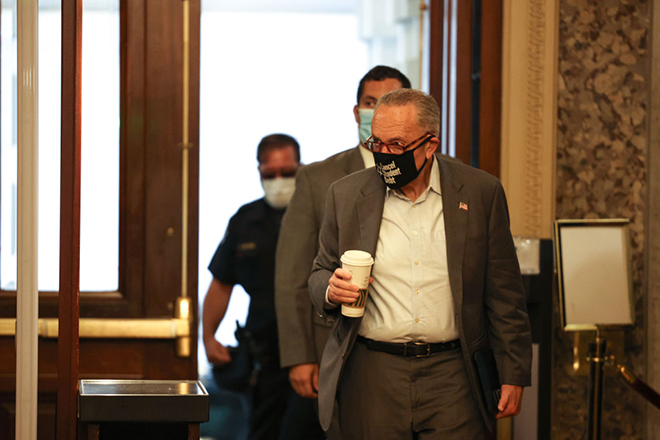Featured Topics
Featured Products
Events
S&P Global Offerings
Featured Topics
Featured Products
Events
S&P Global Offerings
Featured Topics
Featured Products
Events
S&P Global Offerings
Featured Topics
Featured Products
Events
Financial and Market intelligence
Fundamental & Alternative Datasets
Government & Defense
Professional Services
Banking & Capital Markets
Economy & Finance
Energy Transition & Sustainability
Technology & Innovation
Podcasts & Newsletters
Financial and Market intelligence
Fundamental & Alternative Datasets
Government & Defense
Professional Services
Banking & Capital Markets
Economy & Finance
Energy Transition & Sustainability
Technology & Innovation
Podcasts & Newsletters
4 Aug, 2021
By J. Holzman

|
Senate Majority Leader Chuck Schumer, D-N.Y., arrives at the U.S. Capitol Building on Aug. 3, 2021. The Senate has moved on to the amendment process for the bipartisan $1 trillion infrastructure bill, which would fund hard infrastructure improvement and replacement projects. |
Groups representing U.S. battery metals are calling the bipartisan infrastructure deal a win even though the Biden administration only got a small fraction of the electric vehicle support it wanted.
Senators on Aug. 2 revealed a bipartisan agreement on $1 trillion of infrastructure spending stuffed with potential demand drivers for producers of construction metals such as aluminum, copper and steel, including $110 billion of new funds for roads, bridges and work on other large structures.
But lawmakers trimmed spending for green infrastructure. President Joe Biden proposed $174 billion in EV infrastructure spending in March, but the bill released Aug. 2 only included $7.5 billion in new charging station construction and $5 billion in zero- or low-emission buses for the nation's schools.
The bipartisan infrastructure deal "actually does little for the battery metals industry," BloombergNEF analyst Kwasi Ampofo said in an Aug. 4 interview. The metals required to build clean energy buses will be different than those typically associated with passenger EVs, Ampofo said.
"Infrastructure helps; let's not discount that impact. But from a battery metals demand perspective, driving demand for the vehicles is what will actually impact the industry," Ampofo said. "Its good to have the infrastructure, its good to have the capacity, but it will mean nothing if that investment is not made."
Despite the lack of money for fostering demand from sectors such as EVs and renewables, U.S. miners called the deal a win. Over five years, the legislation would provide $3 billion in grants for battery material processing and another $3 billion in grants for battery manufacturing and recycling. It would also invest hundreds of millions into rare earth extraction and mineral mapping programs.
The legislation will allow companies to rely more frequently on U.S. resources as the green economy grows by developing its "nuts and bolts infrastructure," said Ben Steinberg, a representative of the Battery Materials & Technology Coalition, an industry group made up of U.S. battery metals producers and processers.
Steinberg acknowledged that "EV funding is not where it should be" but said the money for midstream processes was a "huge win."
"You can say we should spend all our money on the downstream and the economics will drive the proliferation of the technology, but we're getting all the technology from elsewhere," Steinberg said.
The National Mining Association, which represents U.S. mining interests in Washington, D.C., has not publicly issued its stance on the bipartisan infrastructure deal as of Aug. 4. But in an email, association spokesperson Conor Bernstein said the group believes that "the bipartisan bill is an important step forward."
"This bill is further recognition that the technologies of tomorrow — particularly energy technologies — are far more minerals intensive than those they are replacing," Bernstein said.
Hurdles to getting this money out the door are expected to follow. If the U.S. Senate passes the bipartisan agreement, its fate in the Democratic-controlled House is unclear. Senate Democrats are hoping to pass a budget resolution alongside plotting more spending on climate stimulus, but that will require a difficult and politically perilous budget reconciliation process that will require all 50 Democrats in the Senate to vote in favor.
Amid this debate in Congress, Biden is reported to be unveiling new auto emissions standards alongside representatives of several automakers Aug. 5, E&E News reported Aug. 4. This announcement is likely to be a more significant driver of battery metals in the U.S. than the bipartisan infrastructure deal, Ampofo said.
Possible support for green development from the federal level spurred optimism in the battery metals sector, but Wood Mackenzie Senior Vice President Julian Kettle suggested that analysts were too optimistic about the extent of U.S. green infrastructure investment at the start of the year.
"A whole bunch of bullish analysts have baked into their forecasts a 2 degree scenario … that feeds all the way back to the commodity markets," Kettle said in a July 29 interview shortly after lawmakers had informally struck their deal on infrastructure, a reference to efforts by the U.S. and others to keep planetary warming from climate change from exceeding 2 degrees C above preindustrial levels.